Just a bit of background first, since as operatic arcana goes this one is pretty arcane indeed. The twenty-three year-old Bellini was a final year student at the Naples Conservatorio when he wrote this piece in late 1824, which, having already taken his final exams, effectively constituted a kind of passing-out parade for him. The pre-existing libretto had been written by Andrea Tottola, the court poet to the royal theatres of Bourbon Naples, who had already provided Rossini with the texts of his Ermione and La donna del lago, among others, and would go on to write yet more for Donizetti (who replaced Rossini as the Director of Music at the San Carlo Opera House following the older composer’s departure for Paris). Bellini, an unusually tall and handsome Sicilian by birth, was thus well-placed to establish important connections for the advancement of his career, none more so in the immediate short-term than his introduction to Domenico Barbaia – the San Carlo’s egregious impresario – who made his money from gambling concessions and was, technically, both Rossini’s and subsequently Donizetti’s employer. Adelson e Salvini was never publicly staged in Belllini’s lifetime – it only ever had private, amateur outings at the Conservatorio, surely not as many as Francesco Florimo, Bellini’s mythomane biographer, claimed, and only fetched up professionally as recently as 1985 – but its qualities were such that Barbaia was prepared to commission a new work off the back of it in 1825, Bianca e Gernando, which latter successfully launched the young composer’s career.
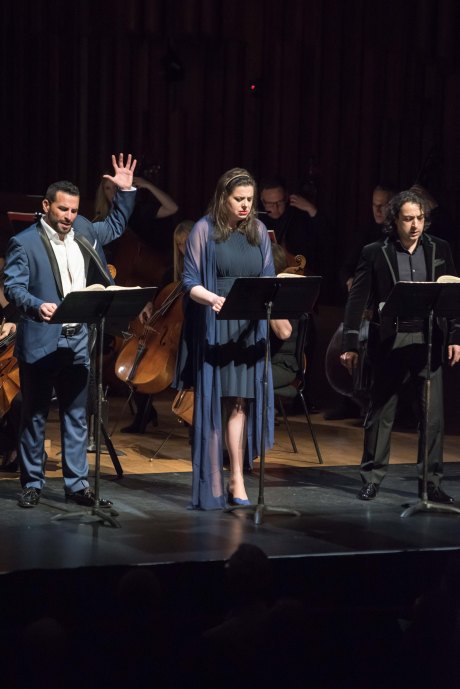
As befits a work wholly in hock musically to Rossinian style and structure, Adelson e Salvini takes the form of an opera semiseria, intermingling low-rent farce with much darker elements which only belatedly yield to a happy ending. The plot, set rather unusually in C17th Ireland, concerns the two titular male friends, the English Milord Adelson and an Italian painter Salvini, and their unfortunate joint love for Nelly, a pretty young orphan – there being any other kind – not to mention Salvini’s secret, unreciprocated love, Fanny. I am not making this up. Anyway, Salvini is well aware of Adelson’s affections (making him bitter and secretive, and easy prey for the wicked Count Struley’s machinations) but Adelson remains unaware of Salvini’s, well into Act III. Bellini revised the piece twice in the later 1820s, presumably with an eye to professional performances that never actually materialised, but for no very compelling reason this semi-staged concert performance, given by the forces of the BBC in association with Opera Rara (whose recording of the piece is already in the can) makes use of the 1824 original, in three acts (as opposed to the revisions’ two) and still featuring that most bizarre of occurrences in Italian opera of any period, actual spoken dialogue (the final revision sees it musick’d as the more acceptable recitativo secco). Why this should be, and what the rationale was behind the choice, the programme notes offer no insight: perhaps the recording’s booklet will (it certainly ought to).
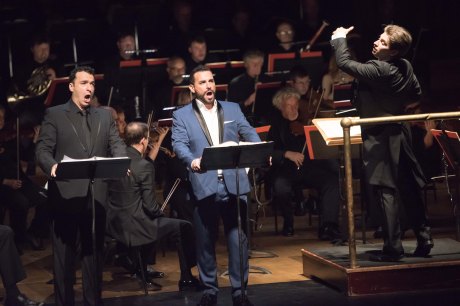
At a spacious 67’ the first act constitutes an insurmountable dramaturgical problem, since nothing actually happens at all plot-wise, the entire, depressing length devoted solely to mapping out no more than the pre-existing situation by means of musical introductions of the various protagonists, one of whom – no less than the titular hero Adelson – takes 58’ to make his first appearance, and then only sings in an otiose ensemble of homecoming welcome that concludes the act’s “drama” (even Turandot, otherwise opera’s longest-delayed entrance, shows her face, if not flexes her larynx, earlier). Conversely, Act II packs non-stop – and wholly preposterous – incident into little more than 40’; whilst Act III ties everything and everybody up neatly in just 20’. The structure is therefore entirely lopsided, and the music, for the most part, rarely rises above the quotidian small-change of Rossinian mannerisms, ticks and tropes (orchestral crescendi, patter-songs, the lot). As performed here, there are two numbers worth salvaging, the first of which Bellini did indeed salvage, recycling Nelly’s Act I cavatina “Dopo l’oscuro nembo” as Giulietta’s “O quanto volte” in 1830 in I Capuleti e I Montecchi; and the other is Salvini’s Act III plea for death, “Si, cadrò”, a strong, highly characteristically “see-saw”-accompanied piece that seems to have died with the opera. Nobody else, frankly, has anything much worth singing – certainly not Lord Adelson, certainly not Count Struley, and absolutely not the indescribably tedious “comic relief” character Bonifacio Vocafrolla, whose rapid-fire repetitious patter songs written almost entirely on one note and in Neapolitan dialect outstay their welcome beyond endurance.
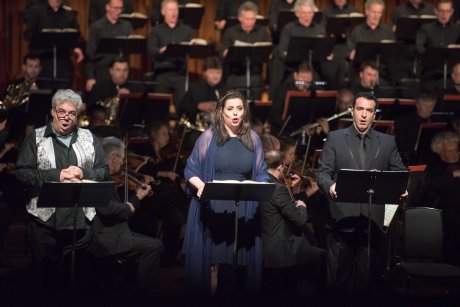
No lost masterpiece, then, and in my view a pretty unworthy candidate for Opera Rara-type exhumation. Still, with the likes of, say, Garanca and Flórez as Nelly and Salvini, I can imagine it working, up to a point. Alas, Daniela Barcellona is entirely the wrong voice-type for Nelly, at best these days a (very) blowsy-toned contralto musico suitable for higher-lying en travesti warrior roles like Malcolm (or Arsace or Tancredi or Sigismondo or Edoardo etc) but utterly unsuited to the reserved, suavely feminine utterances of a young virgin. “Dopo l’oscuro nembo” – which only (only!) needs perfect emission and beautiful tone, being no more than an exercise in seamless line and expression of sorrow – was unbelievably bumpy, the vocal line largely obscured by the effortful vocal production. And, mutatis mutandis, you can say the same about Simone Alberghini’s Adelson, with thick, woolly tone having no real pitch centre to it at all, which rendered what should be the pin-sharp coloratura as nothing more than a smudgy, glottal woofle.
Certain sections of the audience audibly seemed to be getting a great deal out of Maurizio Muraro’s furiously mugged Bonifacio, which I suppose you could call a matter of taste: what is to me a more serious matter of fact was his repeated inability to keep in tempo. You don’t have to do much by way of singing in – quite literally – monotonous patter songs, but my God you do need to keep in strict rhythm, and his, alas, was all over the place, forever lagging behind – and therefore out of musical step with – the machine-gun orchestral accompaniment. His dialogue was conducted in what I don’t doubt was authentic Neapolitan dialect, which may be castratically funny in Naples but doesn’t cut much ice in EC2 (any more than it did in WC2 with the role of Isidoro in Rossini’s Matilde di Shabran at the ROH, a work which Bellini clearly knew very well indeed, though was quite unable to emulate successfully).
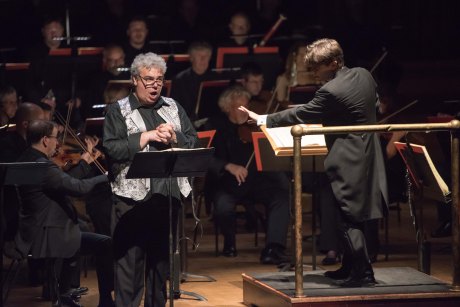
Rodion Pogossov (as the moustache-twirling villain Count Struley) made more of an impression on me in dialogue than actual song, though the timbre is reasonably compact and the emission relatively even, albeit of no great size or distinctiveness. What you need here is a Ramey or a Raimondi in their prime, though to be fair I suspect Pogossov is a more natural stage animal than either of his more vocally distinguished forbears. There was some very decent bit-part work – could you even call these roles comprimarii? – from David Soar as Geronio, Leah-Marian Jones as Mme. Rivers (Adelson’s housekeeper) and Kathryn Rudge as the lovelorn Fanny, which latter occasioned, like Nelly, some classic surtitles along the lines of “O, how I long for Fanny!” and “Where is my Nelly?” (or possibly vice versa).
Which leaves, as is my wont, the best till last. I’ve only heard the resoundingly operatically named tenor Enea Scala once before, last June, on the ill-starred opening night of Covent Garden’s abominable Guillaume Tell, when he sang – as a last-minute replacement! – the role of Ruodi the fisherman in Act I so strikingly that I spent the rest of the (increasingly appalling) evening wishing he’d fill in for John Osborn’s throttled Arnold as well. Tonight, and despite losing his big first act solo – why? Was it a revision piece and therefore puristically excluded? – his Salvini was indeed the evening’s saving vocal grace. The voice is very narrow-bore and focussed – unlike all the spread-toned wobblers around him – and quite steely in timbre, with an en passant hint of Flórez’s characteristic nasality; but if it isn’t exactly a luscious instrument, or ideally warm, it’s clarion clear and very accurate. He made something very fine indeed out of his remaining Act III aria, the only point all night long when I actually felt like applauding, and I’m only surprised that the major houses have been so relatively slow to push him forward in major roles (where it won’t hurt that he’s dark and handsome to boot: short, dark and handsome, it’s true, but two out of three isn’t bad, not least when so many of his coevals don’t even register one).
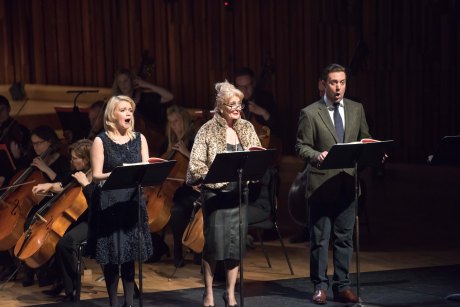
The evening’s other saving grace was the conducting of Daniele Rustioni, who at the ROH made horrors like McVicar’s ghastly Aida just about bearable, and is plainly going places in a hurry. I grew up as a boy watching Muti conduct the Philharmonia and at Covent Garden, and Rustioni is the first Italian since then I’ve thought had something of the same fiercely concentrated skills and musical manner (though whether Muti would have ever bounced up and down on the podium in order to galvanise reluctant audience applause I’m rather doubtful, though I most certainly have seen Yuri Temirkanov do so, and on more than one occasion). The BBC SO – less than 40-strong – made a thoroughly decent showing, and plainly had sufficient regard for the youthful maestro to maintain first-rate ensemble throughout, as did the 18-strong “Opera Rara Chorus” which I take to be a pick-up group of freelance choral professionals (and if they aren’t, they certainly ought to be).
The semi-staging alas didn’t amount to much more than entrances, exits and the odd letter, since notwithstanding the fact that the whole cast have already been recording the work for a fortnight, everyone was still tied to their music stand and scores, with no-one in helpful costume and no meaningful interaction. The house lights were turned way down, which is good both for the legibility of the surtitles and – for reasons I’ve never quite understood – keeping an audience absolutely quiet. But I reserve my biggest black mark of the evening for the ridiculous decision to amplify the spoken dialogue, which therefore emerged, far too loud, not from the singers uttering it, but from some tangentially-placed speakers somewhere above and around them. If a singer can be heard singing in the Barbican without amplification, then they can be heard speaking the same way: the essentials of voice projection are the same, and need no electronic interference of this distracting kind (of course, why they were having to speak at all in an opera for which the composer left sung recitatives, God alone knows, but that’s another matter).
Frankly, a dispiriting evening, overall meriting no more than
2*
But for the contributions of Messeri Scala and Rustioni alone, I’d add another 2* if pressed.
Stephen Jay-Taylor © 2016
(Photos : Russell Duncan)
The amplification of some of the voices was not limited to just the spoken dialogue, I was convinced that the singing of the bass Muraro remained amplified throughout the first act. I did not remain thereafter!